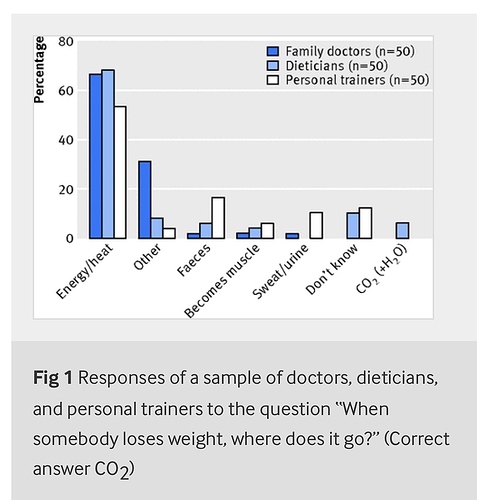 That’s a good one, Mark.
That’s a good one, Mark.
I think CICO gets a bad rap - it’s saying “Take in less than you expend if you want to lose weight.” Then - as Bob refers to, above -
So people start looking daggers at CICO, but CICO says, “Well good grief - you didn’t do the program…”
No, did not say that, and I specifically mentioned that there’s a difference between the digestibility and availability of things. In practice, the pound of body fat will have more available calories than a pound of dietary fat (barring some very substantial difference in caloric density - I’m not even sure that’s possible); the body fat is all available to us. Aside from this consideration, we are still just talking about different weights - if we can agree that a gram of fat has ~9 calories, then why would we disagree about a pound of fat?
Not that I know of. However, I think the poor old ‘bomb calorimeter’ also frequently is the object of scorn and derision, while it’s actually very accurate.
It is not that people simply take the bomb calorimeter figures and declare that a given substance has X amount of calories in it for humans. Digestibility and availability are also taken into consideration (they were thinking about this stuff more than a hundred years ago) - this goes back to Wilbur Atwater and the ‘Atwater System’ which is still largely in use today. It’s not perfect, but It’s pretty darn good.
If anything, in practice foods will often have more calories that what is claimed. The current incentive for food producers to understate things is obvious, and the same for restaurants, probably compounded by human error:
That doesn’t affect what we’re talking about here - it all goes to ATP, etc., as Paul mentioned, above. We eat something - we use it, store it or excrete it, nothing else goes on and there’s no ‘magic’ involved - we’re still only talking about molecules, atoms and their location and energy state.
Sure, weight and energy are not “the same,” per se. But if we want to lose that pound of body weight, there needs to be an inducement for the body to require the energy it will get from it, and to take it out of storage.
You eat food, sure, but as it relates to body weight it almost entirely comes down to just a few elements - carbon, hydrogen and oxygen. When we’re talking about body fat or dietary fat or carbohydrates, that’s all there is. Protein is ~1/6 nitrogen but nitrogen is not involved in ATP production like C, H, and O are.





 That’s a good one, Mark.
That’s a good one, Mark. I’m wondering if 1 gram of body fat means 1 gram of ketones after it’s broken down - it would alter things if it’s not so. Never thought about this before - it just seems like losing 2 out of 9 calories is awfully inefficient, while most times our bodies are disappointingly efficient, from a weight-loss point of view, when it comes to using energy and avoiding starvation - that old evolutionary ‘fear’ our bodies have, if anything.
I’m wondering if 1 gram of body fat means 1 gram of ketones after it’s broken down - it would alter things if it’s not so. Never thought about this before - it just seems like losing 2 out of 9 calories is awfully inefficient, while most times our bodies are disappointingly efficient, from a weight-loss point of view, when it comes to using energy and avoiding starvation - that old evolutionary ‘fear’ our bodies have, if anything.
 ).
).